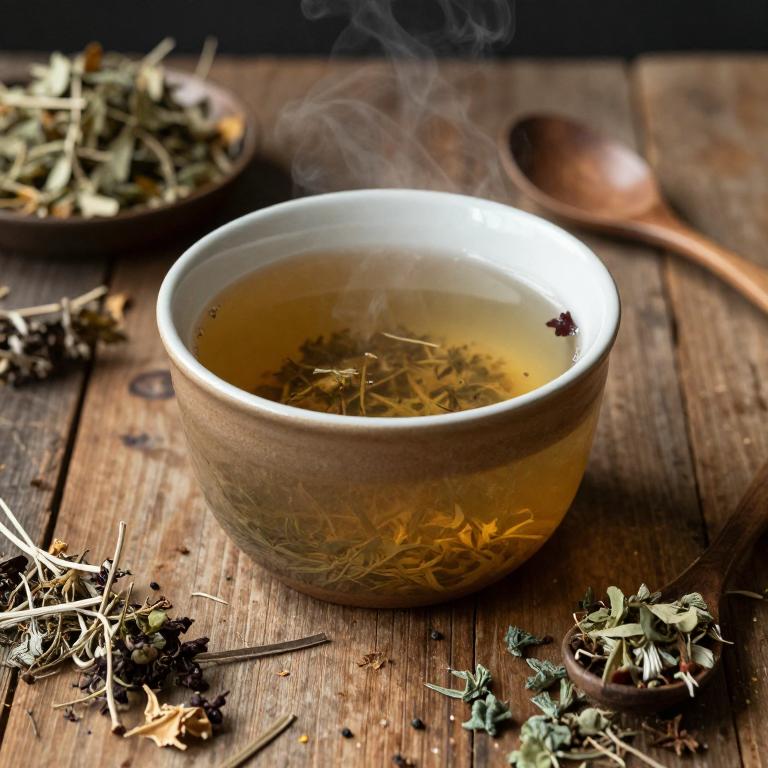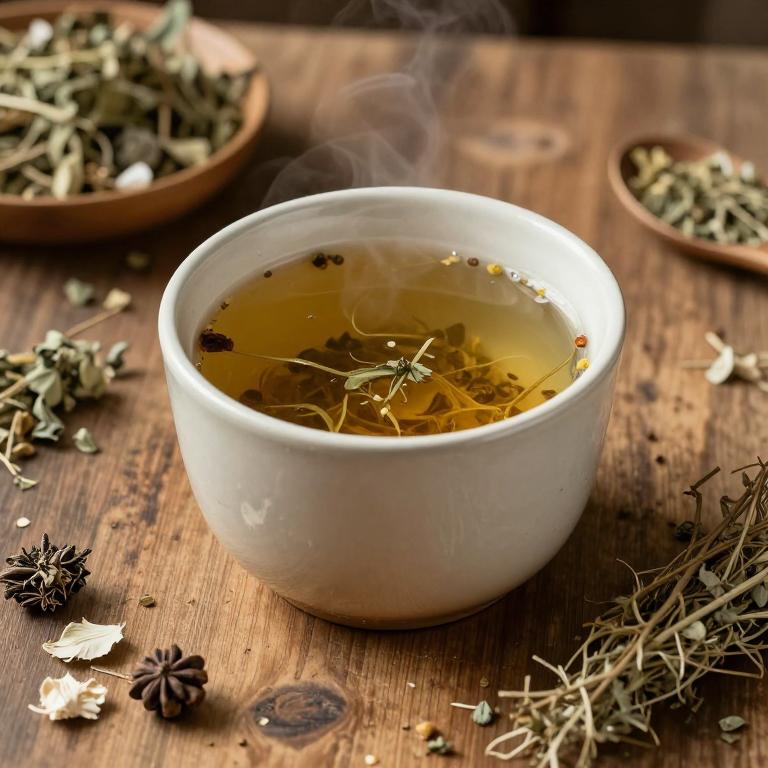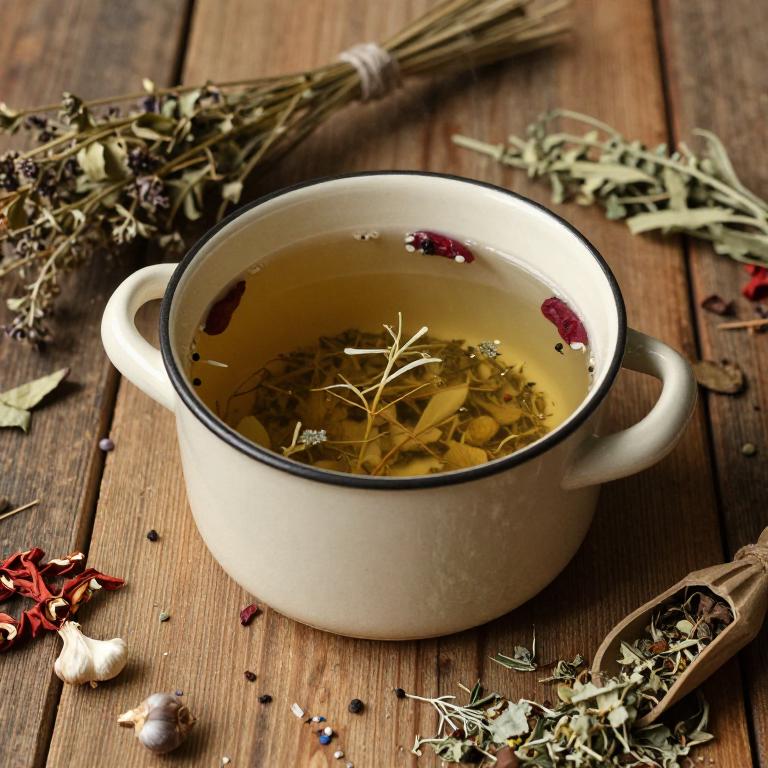10 Best Herbal Decoctions For Chronic Bronchitis

Herbal decoctions have been traditionally used to support the treatment of chronic bronchitis by promoting respiratory health and reducing inflammation.
Commonly used herbs include licorice root, ephedra, and ginger, which are believed to help clear mucus and ease breathing. These decoctions are typically prepared by simmering the dried herbs in water for an extended period to extract their active compounds. While some studies suggest potential benefits, their efficacy can vary, and they should be used under the guidance of a healthcare professional.
Herbal decoctions may complement conventional treatments but should not replace them without medical advice.
Table of Contents
- 1. Eucalyptus (Eucalyptus globulus)
- 2. Thyme (Thymus vulgaris)
- 3. Ginger (Zingiber officinale)
- 4. Licorice (Glycyrrhiza glabra)
- 5. Scots pine (Pinus sylvestris)
- 6. Peppermint (Mentha piperita)
- 7. Chamomile (Matricaria chamomilla)
- 8. Salvia (Salvia officinalis)
- 9. Turmeric (Curcuma longa)
- 10. Stinging nettle (Urtica dioica)
1. Eucalyptus (Eucalyptus globulus)

Eucalyptus globulus, commonly known as the Australian blue gum, has been traditionally used in herbal medicine for its potential respiratory benefits.
Herbal decoctions made from the leaves of Eucalyptus globulus are often prepared by simmering the dried leaves in water to extract their essential oils and active compounds. These decoctions are believed to help alleviate symptoms of chronic bronchitis by acting as a bronchodilator and reducing mucus production. The primary active component, eucalyptol, possesses antimicrobial and anti-inflammatory properties that may support respiratory health.
While some studies suggest that eucalyptus-based remedies can provide symptomatic relief, they should not replace conventional medical treatment for chronic bronchitis without professional guidance.
2. Thyme (Thymus vulgaris)

Thymus vulgaris, commonly known as thyme, has been traditionally used in herbal medicine for its potent anti-inflammatory and antimicrobial properties.
Herbal decoctions made from thyme are often prepared by simmering the dried leaves and flowers in water to extract their active compounds, such as thymol and carvacrol. These compounds are known to help alleviate symptoms of chronic bronchitis by reducing mucus production and soothing respiratory tract inflammation. Studies suggest that thyme decoctions may support bronchial health and enhance immune function, making them a valuable complementary therapy.
However, it is important to consult with a healthcare professional before using thyme decoctions, especially for individuals with known allergies or those taking other medications.
3. Ginger (Zingiber officinale)

Zingiber officinale, commonly known as ginger, has been traditionally used in herbal medicine to alleviate symptoms of chronic bronchitis due to its anti-inflammatory and bronchodilatory properties.
Ginger contains bioactive compounds such as gingerols and shogaols, which help reduce airway inflammation and improve respiratory function. Herbal decoctions made from fresh or dried ginger roots are often prepared by simmering the root in water for several minutes to extract its active components. These decoctions may help ease coughing, reduce mucus production, and provide a soothing effect on the respiratory tract.
However, while ginger is generally considered safe, it is advisable to consult a healthcare professional before using it as a complementary therapy for chronic bronchitis.
4. Licorice (Glycyrrhiza glabra)

Glycyrrhiza glabra, commonly known as licorice root, has been traditionally used in herbal medicine for its anti-inflammatory and expectorant properties.
Herbal decoctions made from Glycyrrhiza glabra are often prepared by simmering the dried root in water to extract its active compounds, such as glycyrrhizin and flavonoids. These decoctions may help alleviate symptoms of chronic bronchitis by reducing airway inflammation and loosening mucus in the respiratory tract. However, long-term use of licorice root decoctions can lead to side effects like hypertension and fluid retention due to its mineralocorticoid-like effects.
Therefore, while it may offer symptomatic relief, it should be used under the guidance of a qualified healthcare provider.
5. Scots pine (Pinus sylvestris)

Pinus sylvestris, commonly known as Scots pine, has been traditionally used in herbal medicine for its potential respiratory benefits.
The bark and needles of the tree are often prepared into decoctions by simmering them in water to extract their bioactive compounds. These decoctions are believed to help alleviate symptoms of chronic bronchitis by reducing inflammation and easing respiratory congestion. The active components, such as flavonoids and terpenes, may act as natural bronchodilators and antimicrobial agents.
While some studies suggest possible therapeutic effects, it is important to consult with a healthcare professional before using pine-based remedies as part of a treatment plan for chronic bronchitis.
6. Peppermint (Mentha piperita)

Mentha piperita, commonly known as peppermint, has been traditionally used in herbal medicine for its soothing and anti-inflammatory properties.
Peppermint herbal decoctions are often prepared by simmering the fresh or dried leaves in water to extract their essential oils and active compounds. These decoctions are believed to help alleviate symptoms of chronic bronchitis by reducing bronchial spasms and clearing mucus from the airways. The menthol content in peppermint may also provide a cooling effect that soothes irritated respiratory tissues.
However, while some studies suggest potential benefits, more clinical research is needed to fully establish its efficacy and safety for long-term use in managing chronic bronchitis.
7. Chamomile (Matricaria chamomilla)

Matricaria chamomilla, commonly known as chamomile, has been traditionally used for its calming and anti-inflammatory properties, and recent studies suggest that its herbal decoctions may offer therapeutic benefits for chronic bronchitis.
The active compounds in chamomile, such as flavonoids and essential oils, help reduce inflammation in the airways and may alleviate symptoms like coughing and mucus production. When prepared as a decoction, chamomile can be consumed as a soothing tea to support respiratory health and ease breathing. While it is generally considered safe, it should be used under the guidance of a healthcare professional, especially for individuals with existing medical conditions or those taking other medications.
Overall, chamomile decoctions may serve as a complementary therapy in the management of chronic bronchitis, though they should not replace conventional medical treatments.
8. Salvia (Salvia officinalis)

Salvia officinalis, commonly known as sage, has been traditionally used in herbal medicine for its potential therapeutic effects on respiratory conditions such as chronic bronchitis.
Herbal decoctions made from the leaves of salvia officinalis are believed to possess anti-inflammatory and antimicrobial properties that may help reduce mucus production and soothe irritated airways. These decoctions are often prepared by simmering the dried leaves in water for an extended period to extract their active compounds. While some studies suggest that sage may support respiratory health, more rigorous clinical research is needed to confirm its efficacy and safety for chronic bronchitis.
As with any herbal remedy, it is advisable to consult a healthcare professional before using salvia officinalis as part of a treatment plan for chronic bronchitis.
9. Turmeric (Curcuma longa)

Curcuma longa, commonly known as turmeric, has been traditionally used in herbal medicine for its anti-inflammatory and antioxidant properties.
Herbal decoctions made from Curcuma longa involve boiling the rhizomes in water to extract active compounds, primarily curcumin, which is believed to contribute to its therapeutic effects. Studies suggest that curcumin may help reduce airway inflammation and mucus production, making it a potential complementary therapy for chronic bronchitis. However, while some preliminary research supports its use, more clinical trials are needed to establish its efficacy and safety in treating this condition.
As with any herbal remedy, it is important to consult a healthcare provider before using Curcuma longa decoctions, especially for individuals with chronic respiratory conditions.
10. Stinging nettle (Urtica dioica)

Urtica dioica, commonly known as stinging nettle, has been traditionally used in herbal medicine for its potential therapeutic effects on respiratory conditions such as chronic bronchitis.
Herbal decoctions made from the leaves and stems of Urtica dioica are believed to help reduce inflammation and mucus production in the airways, offering relief from persistent coughing and bronchial irritation. The plant contains various bioactive compounds, including flavonoids and antioxidants, which may support immune function and reduce oxidative stress associated with chronic respiratory diseases. Preparation of the decoction typically involves simmering the dried plant material in water for an extended period to extract its medicinal properties.
While some studies suggest that Urtica dioica may be a complementary therapy for managing symptoms of chronic bronchitis, it is important to consult with a healthcare professional before using it as part of a treatment regimen.